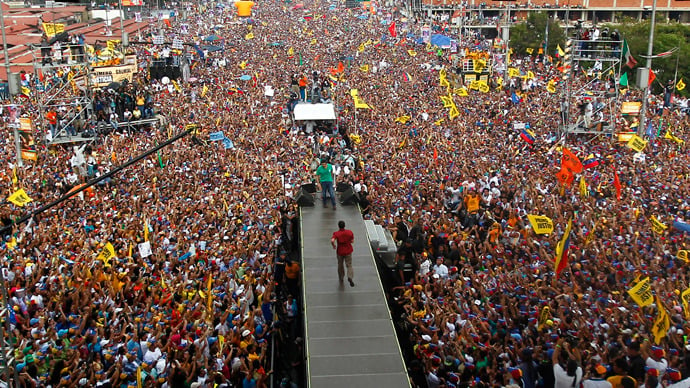
Venezuelan presidential candidate Henrique Capriles, at center in red shirt, takes the stage at a campaign rally, April 2013. State officials say opposition leader Capriles was narrowly defeated by Nicolas Maduro on Apr. 14, but Capriles is demanding a recount. Photo: Reuters / Carlos Garcia Rawlins
The latest twist in the drama that is Venezuelan presidential politics concerns the highly contentious election of last Sunday, April 14. In an election called for by the constitution following the death of sitting President Hugo Chavez, the country faced a choice between Chavez’s hand-picked successor Nicolas Maduro and opposition leader Henrique Capriles Radonski, whom Chavez defeated last October (as I wrote on here).
This time around the results were much, much closer. As described by BBC, the official count had Maduro victorious by just over one percent. Close enough for Capriles to demand a vote-by-vote recount. The U.S. has yet to accept the result.
Of course Maduro is refusing. Of course he blames the U.S. for inciting revolt and generally being meddlesome (police clashes with angry Capriles supporters on Monday, April 15 left seven people dead). Of course Capriles blames the government for the outbreak of violence, and calls a Maduro an “illegitimate” leader under a recount is held.
That Capriles increased his support from October shows that a sizable group of Venezuelans are willing to consider an alternative to Chavez’s way of doing things. This is an encouraging development — democracy is supposed to reflect the people’s will.
And maybe they think it is time for a change — shades of the 2008 U.S. election perhaps? But regardless of the result, the truth has to win out. With a race that close asking for a recount is a reasonable and justifiable measure, in spite of the rhetoric that may come from those in power. Knowing who truly won the election will be in Venezuela’s best interest, helping it move forward with collective resolve to tackle the serious economic, social and political challenges that lie ahead.
Check out FPA blogger Marie Metz’s take on the Venezuelan election at Foreign Policy Blogs’ “The Americas” page.